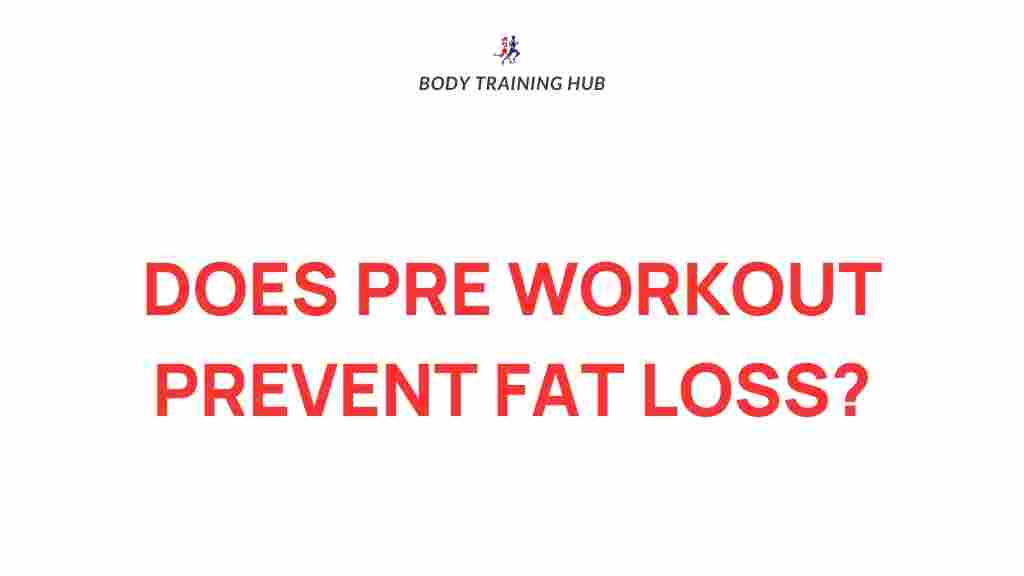Unveiling the Truth: Can Pre-Workout Actually Hinder Fat Loss?
In the ever-evolving world of fitness, one question that constantly arises is whether pre-workout supplements can actually hinder fat loss. With a myriad of products available in the market, each promising to enhance performance, boost energy, and optimize workouts, it’s essential to scrutinize their real impact on fat loss and metabolism. This article delves into the relationship between pre-workout supplements and fat loss, providing insights into their effects, benefits, and potential drawbacks.
Understanding Pre-Workout Supplements
Pre-workout supplements are designed to be taken before exercise to enhance performance. They typically contain a blend of ingredients such as caffeine, amino acids, creatine, and various other compounds that aim to improve energy, focus, and endurance. While many athletes and fitness enthusiasts swear by these products, it’s crucial to understand how they might affect your weight loss journey.
The Mechanism of Fat Loss
To grasp how pre-workout supplements might influence fat loss, we first need to understand the basics of fat metabolism:
- Caloric Deficit: Fat loss occurs when you consume fewer calories than you burn. This principle is fundamental to effective weight loss.
- Increased Metabolism: Certain ingredients in pre-workout supplements, like caffeine, can temporarily elevate your metabolism.
- Exercise Intensity: Higher workout intensity can lead to greater calorie burn, contributing to fat loss.
Given these factors, let’s explore how pre-workout supplements might fit into this equation.
The Potential Benefits of Pre-Workout Supplements
When used correctly, pre-workout supplements can offer several benefits that might indirectly support fat loss:
- Enhanced Energy Levels: Ingredients like caffeine can provide a significant energy boost, allowing you to work out harder and longer.
- Improved Performance: Better performance means potentially burning more calories during workouts, which can aid in creating a caloric deficit.
- Increased Focus: Enhanced mental clarity can help you stay motivated and committed to your fitness goals.
Key Ingredients in Pre-Workout Supplements
Understanding the key ingredients in pre-workout supplements can help you make informed choices:
- Caffeine: Widely used for its stimulant effects, caffeine can enhance energy and increase metabolic rate.
- Creatine: Known for improving strength, it can help you perform high-intensity workouts effectively.
- Amino Acids: Such as BCAAs, which may aid in muscle recovery and reduce exercise fatigue.
Can Pre-Workout Supplements Hinder Fat Loss?
Despite their potential benefits, there are scenarios where pre-workout supplements might hinder fat loss:
1. Overconsumption of Calories
Some pre-workout supplements contain additional ingredients that can lead to an increased caloric intake. For example, those that include sugary additives or high-calorie formulas can negate the caloric deficit needed for fat loss.
2. Increased Appetite
Some individuals may experience increased appetite after taking pre-workout, leading to overeating post-exercise. If you consume more calories than you burn, it can hinder your weight loss efforts.
3. Water Retention
Ingredients like creatine can cause water retention, making you feel heavier and potentially skewing your weight loss progress. This can be disheartening for those tracking their weight closely.
4. Dependence on Stimulants
Relying heavily on stimulant-based pre-workout can lead to a dependency, where individuals feel they cannot perform well without these supplements, potentially reducing the quality of their workouts without them.
How to Use Pre-Workout Supplements Effectively
If you choose to incorporate pre-workout supplements into your fitness routine, consider the following tips to maximize their benefits while minimizing any potential downsides:
- Read Labels: Always check the ingredient list and nutritional information to avoid unnecessary calories.
- Monitor Your Body: Pay attention to how your body responds to pre-workout. Adjust the dosage or type of supplement if you notice any adverse effects.
- Stay Hydrated: Ensure you’re drinking enough water, especially if your supplement contains diuretic ingredients.
- Combine with Whole Foods: Use pre-workout as part of a balanced diet that includes whole foods to support overall health and metabolism.
Possible Alternatives to Pre-Workout Supplements
If you’re concerned about the potential hindrance to fat loss, there are alternatives to consider:
- Whole Food Sources: Natural sources of energy like bananas, oats, or yogurt can provide a healthier alternative to pre-workout supplements.
- Hydration: Staying well-hydrated can enhance performance without the need for extra stimulants.
- Quality Sleep: Prioritize sleep to ensure your body is well-rested and ready for exercise, which can reduce the need for stimulants.
Troubleshooting Tips for Fat Loss and Pre-Workout Use
If you find that pre-workouts are not aligning with your fat loss goals, consider these troubleshooting tips:
- Track Your Intake: Keep a food diary to track caloric intake and ensure you’re maintaining a caloric deficit.
- Adjust Timing: Experiment with taking pre-workout at different times relative to your workouts to find what works best for you.
- Consult a Professional: If unsure about supplements, consulting a nutritionist or fitness professional can provide personalized guidance.
Conclusion
In conclusion, while pre-workout supplements can provide benefits that enhance exercise performance and potentially aid in fat loss, they can also pose risks that may hinder your weight loss journey. Understanding your body’s response to these supplements, monitoring your overall caloric intake, and making informed choices about your supplements are essential steps in your fitness journey.
Ultimately, the key to successful fat loss lies in a well-rounded approach that includes a balanced diet, regular exercise, and mindful supplement use. For those new to fitness or struggling with weight loss, consider seeking guidance from a fitness professional or a nutritionist to tailor a plan that works for you.
For more information on effective strategies for weight loss and fitness, check out this detailed guide on optimizing your workout regimen.
This article is in the category Myths & Facts and created by BodyTraining Team
